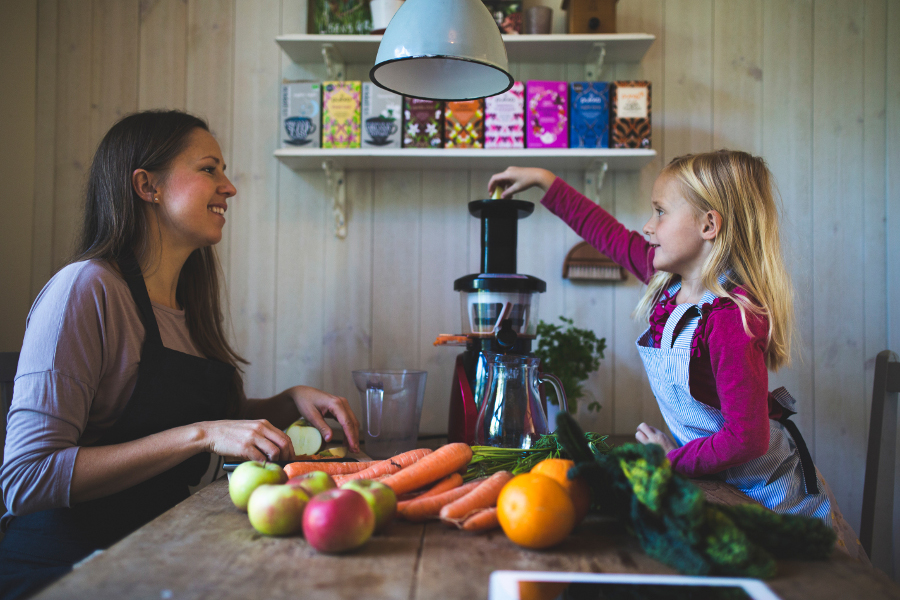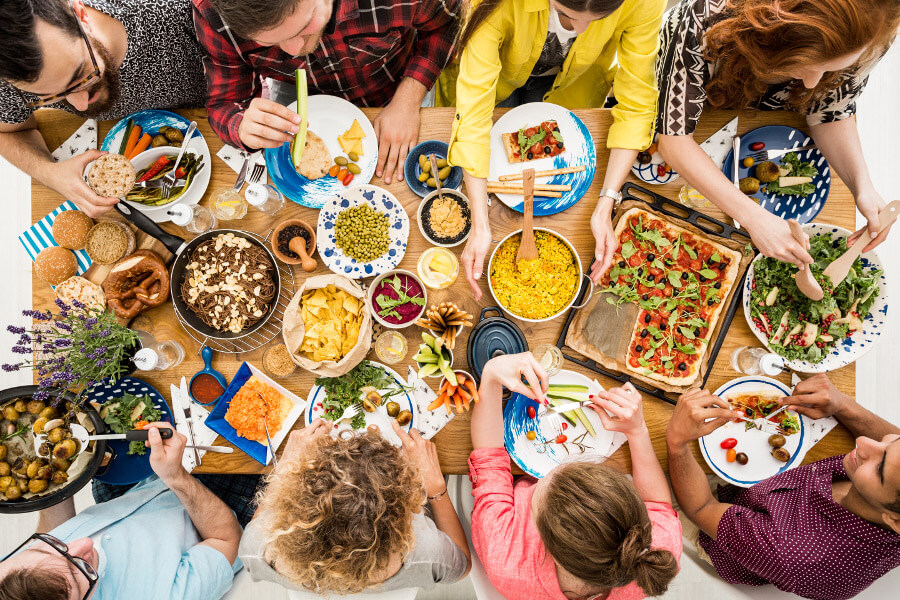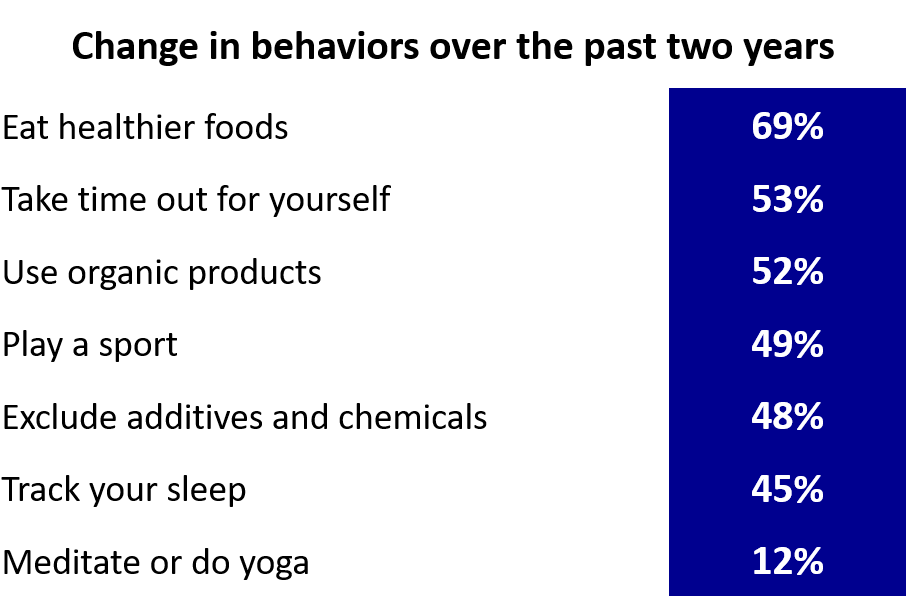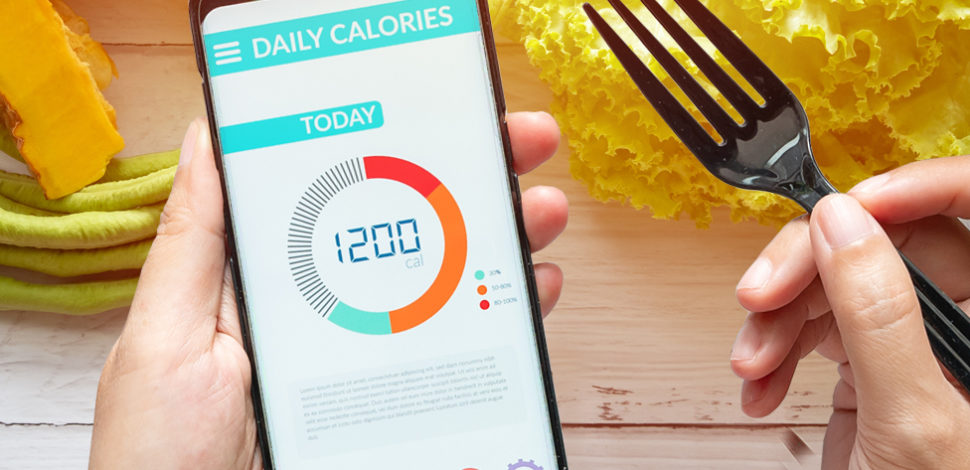Eating right : France’s new health goal ?
Never has so much attention been paid to the links between nutrition and health. A bevy of new food apps and connected objects focusing on nutrition are contributing to the trend. The month’s spotlight on health would not be complete without a closer look.
53% of people in France think about what they need to do to be and stay healthy (versus 43% in 2016). This is what a new survey of French people’s preoccupations, conducted by AXA in 2019, has revealed.
In addition to playing a sport – which one in two respondents do – people consider that eating the right food can improve their health. Two thirds of French people say they eat healthier foods and half use organic products.
Two thirds of French people eat healthier foods

This general increase in awareness of the impact of eating habits on health is backed by science. According to the research organization INSERM*, “Nutrition plays a role in most common chronic diseases.”
“Faced with the rise of diseases such as obesity and diabetes, the French are increasingly ready to commit to a healthier lifestyle, which includes better eating habits,”
says Lucie Arribard, an agribusiness specialist for a large agri-food group.
An offshoot of this is the rising popularity of so-called elimination diets. “Whether for health or ethical reasons, they consist in eliminating one or more ingredients, such as meat, lactose, or gluten, from your diet,”
she explained.
People are growing more aware of the environmental and social impacts of their food choices on the world
This trend is expected to continue in the years ahead. “People are growing more aware of the environmental and social impacts of their food choices on the world,”
says Lucie Arribard. “And the more informed consumers are, the more they want to know about what is on their plate. Food industry players need to adapt to consumers’ rising concerns. Four or five years ago, the issue was not raising much interest in the agri-food sector. Today, it has taken the industry by storm, as can be seen in the proliferation of new product ranges.”
Supermarket shelves are in fact stocked with a multitude of labels, seals of approval and marketing catchphrases. It’s not always easy for consumers to decipher the meaning behind them. Now, shoppers have to consider not only price and taste, but also origin, ingredients, and manufacturing working conditions. To meet this demand for information and decision aids, technology has created a niche.

Digital aids for eating better
Various digital solutions, encompassed by the term foodtech, are offering consumers ways to better control what ends up on their plates. They include workout and/or nutritional apps, such as My Easy Santé (My Easy Health), which collects lifestyle data to help people lead healthier lives. Curious connected objects are also popping up everywhere, such as a vibrating fork to encourage users to eat more slowly. Meanwhile, online resources such as the Nutriscore or Data for Good**, nicknamed the “Wikipedia for food”, have attracted many followers. However, the most visible change is the explosion of mobile apps used to assess the nutritional quality of food products.
These barcode scan apps still help consumers make more informed choices
They go by names such as Yuka, Kwalito, or Foodvisor, and in the past few years, they have won over thousands of consumers.
“Free and easy to install and use, these tools are a perfect match for the needs of consumers who are devoting less and less time to food shopping, cooking and, in general, meals,”
says Lucie Arribard.
However, she does have a few reservations about such apps. “For example, the scores generated by barcode scan applications can be simplistic and should not always be taken at face value. It’s important to understand how their algorithms work in order to use them correctly. And remember that these tools do not analyze non-processed foods. And yet such foods are the staple of any effort to eat healthier.”
Despite these drawbacks, the popularity of these new “eating coaches”
are an “excellent sign”
, says the expert. It shows the interest that French people are taking in their nutrition.
But even though technology is helping to spread information, an understanding of nutrition is still needed to single out the useful tools from the rest.
Main findings of AXA’s survey

The latest findings (H1 2019) from AXA’s survey of what French people are concerned about (Observatoire des Préoccupations des Français) offer interesting insight.
According to the survey, people in France are increasingly worried about health issues: 53% of respondents say they think about how to be and stay healthy (up from 43% in 2016). They have also changed their behaviors: Two thirds of respondents say that they eat healthier foods, half of those surveyed use organic products, and half now play a sport.






 Actualité précédente
Actualité précédente  Toutes les actualités
Toutes les actualités  Actualité suivante
Actualité suivante